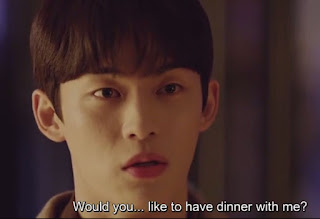In a prior post comparing Dear Doctor to Something in My Room, I suggest that supernatural romances must overcome two issues: potentially incomprehensible rules; too much lecturing tell-no-show.
In sum, with supernatural shows, there needs to be consistency and there need to be pay-offs.
The (Weird) Director Who Buys Me Dinner (I've encountered both titles)--which impressively brings almost all the threads together at the end--suffers, oddly enough, from not enough lecture. The rules are reasonably comprehensible--they don't really need to be explained--but the reason for Denis's anger is never entirely addressed.
And the reason for Denis's anger needs to be addressed. Otherwise, what will stop his obsession and rage from causing a death a second time? Is the couple always doomed?
*Spoilers!*
The following explanation is based on the television series, which should be able to stand alone.
My explanation: When Young Master Min gives the Child of God a name--Dongbaek--he commits an act that makes him responsible for the young man's future. He fails to live up to that obligation when a family retainer kills Dongbaek to prevent the lovers running off together. 300 years later, Director Min Youdam encounters Dongbaek when the 27-year-old applies for a position on the production side of his company. He appropriates Dongbaek for his office; he knows, in a textbook way, that he needs to "fix" the relationship, but he doesn't entirely remember what went wrong. He has buried that knowledge behind an arrogant demeanor and attitude. There's more than a hint of "hey, I'm the victim of God's anger here," such as when he accuses Dongbaek of being God's "favorite" and when he protests that he is the cursed one.He isn't an evil man. Rather, like Supernatural's ghosts, Min's lingering mortality has pushed him into a closed-off, self-protective state. He runs the entertainment business as a way to network, to eventually attract Dongbaek's notice. However, his attitude when they do meet is more exasperated than romantic. It's about time! None of which is helped when Dongbaek doesn't remember their relationship. Great! Now, I have to do this whole relationship thing by myself.
In return, Dongbaek is bewildered and also exasperated: I have to have dinner with this guy for the rest of my life? Does having dinner even count as a date? (The answer from the spirits is: Sort of.)But sweetly--and believably--they begin to build a relationship, to fall in love again. For one, Dongbaek is no longer held back by the historical class distinction and can take more direct action.
However, the singer/celebrity/idol Denis--represented by Min's company, addicted to over-the-counter medications, and on the verge of a nervous breakdown--attacks Director Min and inadvertently fatally wounds Dongbaek, at which point Min must make a decision. He (finally) takes full responsibility for his failure to protect Dongbaek so many years in the past.
 |
| Denis |
I suggest that the connection here between Denis's rage, Director Min's actions, and Dongbaek's death is that Director Min's arrogance and closed-off heart have led him to take advantage of Denis and ignore obvious problems with Denis (much as he ignored obvious reactions to his relationship with Dongbaek in the past). Dongbaek's appearance complicates matters. Denis becomes an avenging angel/demon.
 |
| Dongbaek when possessed |
The final scenes imply, in passing, that Denis and Director Min are now working together without problems. In the meantime, Dongbaek has gotten the job he was supposed to have in the first place. This time, he approaches Director Min, who exhibits a softer demeanor overall.
It's a Scrooge tale! Except Director Min doesn't change from a miser without human feelings to a good guy. He changes from an okay guy who thinks he is a victim to a good guy who has finally taken responsibility for and made peace with his past.
The hints are there--a few more would be nice.



